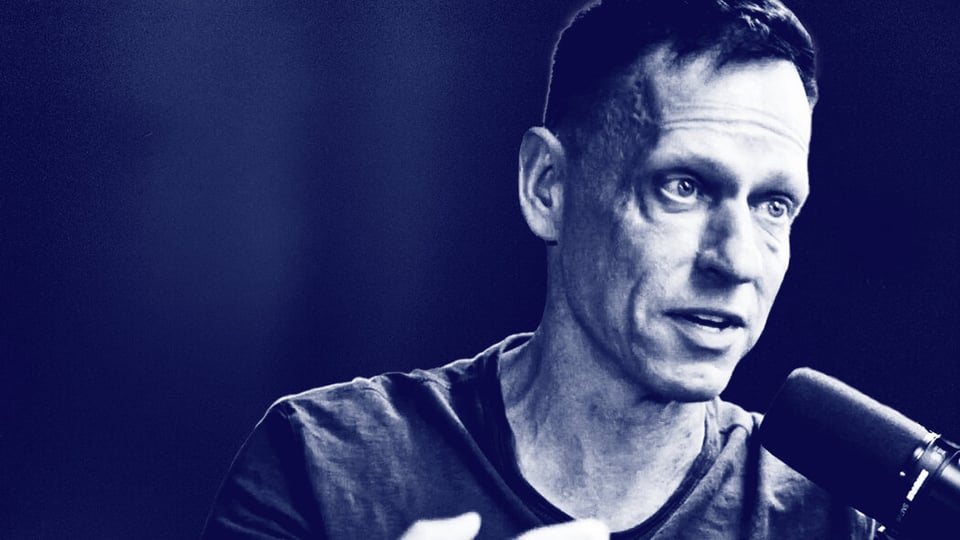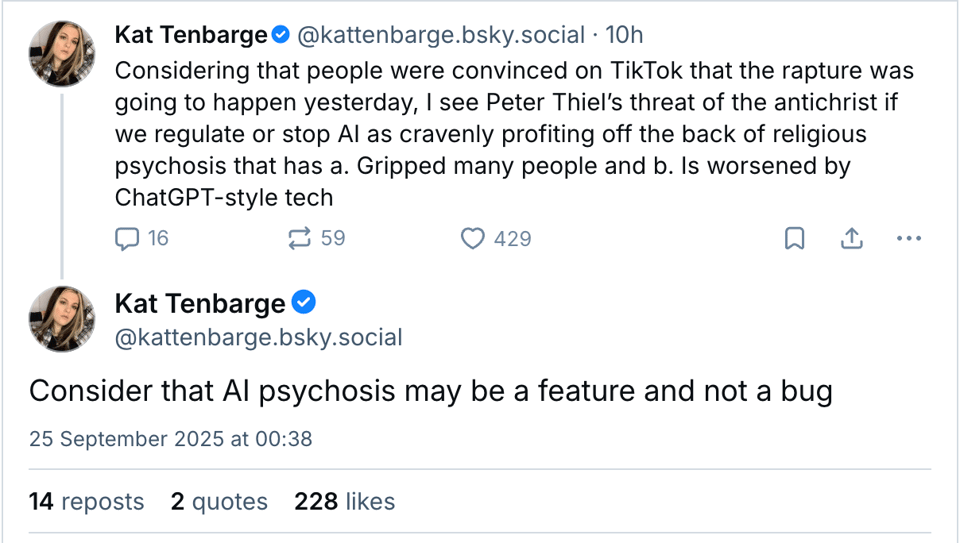This week if you’ve spent any time on socials you’ve probably encountered the idea that many US evangelical Christians had suddenly decided that the Rapture was occurring on Tuesday and/or Wednesday.

For those of you blissfully unaware (congratulations on your media diet), let me give you some quick background. The Rapture is a millennialist idea in protestant Christianity that at some point Jesus will return and “take up” believers, leaving everyone else behind to endure a great tribulation. The BBC has a simple explainer of these pretty complex ideas here. The important thing to note is that the rapture is not mentioned in the Bible, and that Christ is extremely clear that no-one knows when He is coming back. Matt 24:36 says:
“But about that day or hour no one knows, not even the angels in heaven, nor the Son, but only the Father.
Despite this, people have been solidly predicting Christ’s return since at least the year 500. Take a scroll through the lengthy Wikipedia entry Predictions and Claims for the Second Coming and you’ll see what I mean. At the end you’ll hit the most recent prediction, which led to all the tiktoks this week, from a South African preacher known as “Brother Joshua” who was totally adamant Tuesday (and/or Wednesday) was the day.
It’s easy to dismiss this as pretty silly, and despite the number of “rapturetok” videos floating around, a solid percentage of them seemed to be satire, non-believers poking fun, or clout-chasers posting instructions for what to do when you are (or are not) raptured in an attempt to cash in on a trending topic. But it sits at the intersection of some pretty difficult and conflicting ideas that are worth understanding.
The first is a topic so big I’m not even going to attempt to unpack it fully here. That’s the idea that for a certain subset of US evangelicals who subscribe to this eschatology, it’s their responsibility to set the conditions for Christ’s return. At one end of the spectrum that leads to Texan ranchers breeding red cattle and shipping them to Israel in some attempt to fulfil a prophecy about rebuilding the Temple in Jerusalem. At the other, bloodier end of the spectrum, it results in an unwavering commitment to support the state of Israel (which must exist for the end times to come about). If you’re interested in diving into this in detail, Al Jazeera has a documentary series on Youtube called Praying for Armageddon.
The second is what happens when (inevitably) a specific prediction about the end times does not come true. Again, it’s easy to laugh at believers as a deadline comes and goes, but science tells us that when a prophecy fails, the cognitive dissonance (and sunk cost effect) that believers experience actually often causes them to double down rather than walk away. We’ve seen that with UFO cults, doomsday cults, and more recently with QAnon conspiracy theorists who watched prediction after prediction fail to eventuate, but remained unwavering in their belief. It’s the same thing that keeps Larries going despite Louis Tomlinson’s best efforts. Teen Vogue has a great piece this week interviewing people who had been raised in rapture theology, and it’s worth a read.
The third idea is one of consequences. If you genuinely believe the world is about to end and that you, in some way, will be spared that, you have little or no obligation (or motivation) to do anything to improve the lot of those around you, or to take action against the climate crisis, or stand up for the oppressed, because it will all be over and you’ll be gone soon. To be clear (and not to be all Not All Christians, but), that’s not the way most Christians think. In fact there’s a whole Christian environmentalist movement based on the idea that we should be good stewards of creation. But for doomsday cultists and end times extremists, there’s a risk this becomes the dominant mindset and it can lead to some horrifying outcomes (like the Daybell murders).
All of this is top of mind for me this week because of the way these ideas have suddenly started turning up in the most secular of all spaces — the tech sector. Some of you might have seen Peter Thiel (New Zealand’s most embarro adoptee), the epitome of capitalist techno-rationalism who hosts a “heresy” conference, suddenly doing a four-part lecture series about, of all things, the Antichrist.

Hunting for what the hell was going on here, I found this excellent podcast that explains all this from both a theological and a political standpoint:
“Once we label our adversaries in these cosmic terms—all good versus all evil—there's now going to be no compromise,” says Dr. Fuller. “No rational discourse is possible, because the Antichrist is a deceiver, so all the arguments that might be brought for the worth of an opposing point of view are ‘deception.’ And so there can be no rational compromise. It only will bring out all-out tribal cohesion, tribal loyalty, unquestioning commitment. And so it usually leads to...sometimes violent consequences.”
Watch/listen to the whole thing here:
Thiel has called Greta Thunberg an antichrist, if that gives you a better sense of what’s going on.
In an era in which people are predicting sentient artificial general intelligence (AGI) is around the corner and will be omniscient and god-like, and in which people are now “chatting with god” using chatbots, or generating their own “AI religions”, the rise of religious language and concepts among the very people funding and hyping this technology is something we should all be paying attention to.

And we should also be thinking about the base these messages are playing to. If you think Thiel doesn’t know exactly who he’s dog-whistling to, I have a bridge to sell you. From the pod above:
A lot of what we've seen on the political right, especially in the last 15 years, is a “I'm not going to be woke anymore”. If woke means I got to care about other people, and no one's going to regulate me, and no one's going to tell me I can't use all the electricity or gas that I want to. And what I think I see is using this literature just to double down efforts at anyone who would tell us that we have to make some kind of self adjustment to become a better, socially-conscious person. And it's a total rejection of any need to have empathy, to be responsible for any larger group. And so it's this rugged individualism. And so the antichrist is viewed as anyone who's trying to thwart that.
Rugged individualism. An American ideal.
So, what might have come across as a funny viral moment on tiktok is part of a much longer story: one in which failed prophecies entrench belief, end-times theology corrodes responsibility for the here and now, and ordinary disagreements are elevated into cosmic battles of good versus evil. When these same motifs turn up not only in fringe congregations but in the rhetoric of the most powerful actors in technology and finance, they aren’t harmless curiosities. They begin to shape the frameworks through which decisions are justified and policies are defended.
This is why the language matters. To cast opponents as “antichrist” or to imagine salvation in the form of divine intervention or artificial super-intelligence is short-circuiting the possibility of dialogue and compromise. It replaces the slow, unglamorous work of empathy and responsibility with a mythology of inevitability. Against that backdrop, insisting on care, stewardship, and the unfinished project of community isn’t naïve — it is the most urgent form of resistance we have.
previously, on
This week there were a bunch of things that crossed my path that made me think about previous issues.
last month, we talked about holograms, avatars, and the soul of a digital copy. If you’re at LA Comic Con this week, you can apparently interact with an AI version of comics legend Stan Lee, in a truly gruesome “money grab from beyond the grave”.
back in May, we talked about Disney Adults. In the midst of the Kimmel suspension backlash, many Disney Adults spoke out about the ABC decision and turned their backs on the corporation. Another example of the power these consumers wield.
regular readers will know that I’m a generative AI skeptic. Open AI’s own researchers have now published a study confirming that “large language models will always produce hallucinations due to fundamental mathematical constraints that cannot be solved through better engineering”.
back in May, I was writing about how television soundtracks hadn’t ever hit the heights of the 2000s. I think I’ve been proven wrong by (like everyone) binge watching the final season of The Summer I Turned Pretty. I feel like I have a whole essay in me about the music choices, which — yes — are heavy on the contemporary (Sabrina, Taylor, Charlie etc), but also seemed to have been picked for an Gen X/Elder Millennial audience. Dreams (The Cranberries), No Suprises (Radiohead), Heartbeats (José Gonzalez), Into the Mystic (Van Morrison), Paper Planes (MIA), Skinny Love (Bon Iver). I kept thinking — is this a music director who is my generation picking what they love, or is it a deliberate acknowledgement that the audience for these shows is actually women my age. Anyway, give me a whole interview with this person, I want to know everything.
more good stuff
loved this from History of the Web about Stumble Upon.
After a bit, they were coming around to an idea that was something like a channel changer. They wanted to simulate the feeling of flipping through channels on the TV, but while surfing the web. That was the idea that stuck. In 2001, they built a browser toolbar where people could click a “Channel” button and be randomly brought to a new website. Clicking the channel button again would load an entirely new website. And on and on. Before long, they scrapped the word channel in favor of “Stumble” and renamed the toolbar to StumbleUpon.
over at Fansplaining, Aja Romano has written a great new piece about KPop Demon Hunters, its fandom, and what it means for kpop generally.

as a former debater (the unspeakable vice of the greeks), the handwringing over the death of Charlie Kirk has felt a bit like the culmination of years of aggressive “debate me” from the right and idealistic “maybe we should debate them?” from the left. It was clarifying to read this piece from Garbage Day about Speakers’ Corner in the UK, and what’s changed over the last few years.
finally, in my lego city

Forward this email to someone who has been Left Behind.
You just read issue #39 of what you love matters. You can also browse the full archives of this newsletter.

Add a comment: